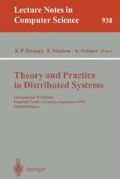Abstract
In the context of typical CSCW environments (geographically dispersed, mobile hosts, component failures, concurrent activities) applications which help to overcome the limitations of space and time in collaborative work are extremely difficult to build. The major source of complexity lies in implementing mechanisms for access, manipulation and consistency of shared information. These mechanisms however are fundamental to a wide variety of CSCW applications. COCOON is an object-oriented application framework, which addresses these issues. It provides the abstraction of a shared information space which supports the interaction of members in a collaborative session. In this context COCOON offers a variety of CSCW specific information modelling, interaction and consistency mechanisms built upon the paradigm of causally and totally ordered communcation (CATOC). A major focus is the support for autonomous work, where team members disconnected from the session can alter information and later rejoin by merging their changes with the changes occured in the session in a consistent way.
Preview
Unable to display preview. Download preview PDF.
References
The Association for Computing Machinery. Proceedings of the 1992 ACM Conference on CSCW — Session on consistency in collaborative systems, Toronto, November 1992.
K.P. Birman and other. The ISIS Distributed Toolkit, Version 3.0. ISIS Distributed Systems Inc., September 1992.
Birman, K. Lightweigth causal and atomic group multicast. ACM Transactions on Computer Systems, 8(3), 1991.
Blair, G. Rodden, T. A survey of CSCW systems. Interacting with Computers, 3(3), 1991.
Bobrow, D. Foster, G. Lanning, S. Stefik, M. Tatar, D. WYSIWIS Revised: Early Experiences with Mulit-User Interfaces. ACM Transactions on Office Information Systems, 5(2), 1987.
Brothers, L. et al. Icicle — groupware for code inspection. In Proceedings of the 1990 ACM Conference on CSCW, Los Angeles CA, October 1990.
Isis Distributed Systems Inc. Reliable Distributed Objects for Smalltalk — Users Guide. ISIS Distributed Systems Inc., Ithaca, NY, April 1994.
Codd, S. Jourdan, M. Object-Oriented Design and Analysis. Prentice-Hall, 1991.
Davidson, S. Garcia-Molina, H. Skeen, D. Consistency in partitioned networks. ACM Computing Surveys, 17(3), September 1985.
Dittrich, K. Dayal, U. Buchmann, A. On Object-Oriented Database Systems. Springer Verlag, 1991.
Ellis, C. Gibbs, S. Rein, G. Groupware — Some Issues and Experiences. Communications of the ACM, 34(1), 1991.
Greenberg, S. Marwood, D. Real-Time Groupware as a Distributed System: Concurrency Control and its Effect on the User Interface. In Proceedings of the 1994 ACM Conference on CSCW, Chapel-Hill, October 1994.
Kistler, J.J. Disconnected Operation in a Distributed File System. PhD thesis, Carnegie Mellon University, 1993.
Knister, M.Prakash, A. DistEdit: A Distributed Toolkit for Supporting Multiple Group Editors. In Proceedings of the 1990 ACM Conference on CSCW, Los Angeles CA, October 1990.
Knister, J. Prakash, A. Undoing Actions in Collaborative Work. In Proceedings of the 1992 ACM Conference on CSCW, Toronto, November 1992.
Lee, J. SIBYL — A Tool for Sharing Knowledge in Group Decision Making. In Proceedings of the 1990 ACM Conference on CSCW, Los Angeles CA, October 1990.
Marshak, D. ANSA — A Model for Distributed Computing. Patricia Syebold Network Monitor, 6(11), 1991.
R. Needham. Naming. In Distributed Systems. ACM Press, 1989.
Pfaff, O. Security Services for CONUS. Technical report, Siemens Corporate Research and Development, Munich, Germany, August 1994.
Reinhard, W. Schweitzer, J. Voelksen, G. CSCW Tools: Concepts and Architectures. IEEE Computer, 27(5), 1994.
Satyanarayanan, M. et al. Experience with Disconnected Operation in a Mobile Environment. In Proceedings of the USENIX Symposium on Mobile and Location Independent Computing, Cambridge, MA, August 1993.
van der Linden, R. The ANSA Naming model. Technical Report AR.0003.01, The ANSA Consortium, Cambridge (UK), February 1993.
Author information
Authors and Affiliations
Editor information
Rights and permissions
Copyright information
© 1995 Springer-Verlag Berlin Heidelberg
About this paper
Cite this paper
Kolland, M. (1995). Support for information sharing in CSCW based on causally and totally ordered group communication. In: Birman, K.P., Mattern, F., Schiper, A. (eds) Theory and Practice in Distributed Systems. Lecture Notes in Computer Science, vol 938. Springer, Berlin, Heidelberg. https://doi.org/10.1007/3-540-60042-6_5
Download citation
DOI: https://doi.org/10.1007/3-540-60042-6_5
Published:
Publisher Name: Springer, Berlin, Heidelberg
Print ISBN: 978-3-540-60042-8
Online ISBN: 978-3-540-49409-6
eBook Packages: Springer Book Archive

